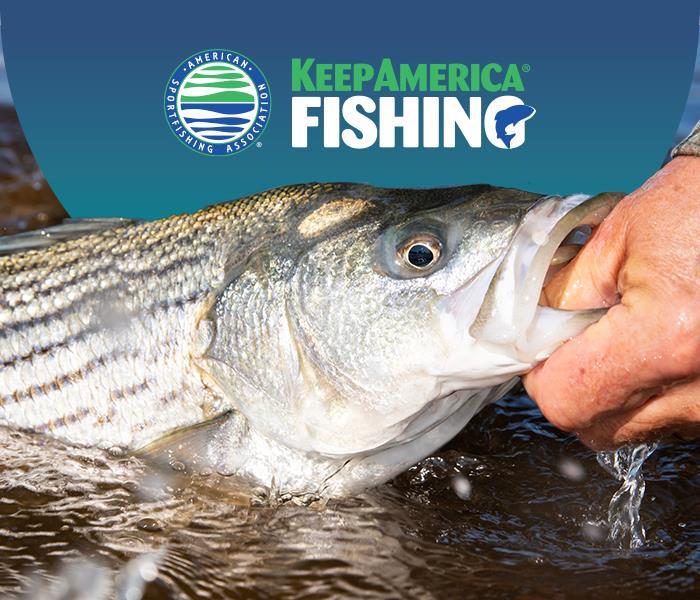
Mixed results from ASMFC Annual Meeting
by Rob Shane 3 Nov 2025 16:31 PST
October 27-30, 2025

Keep America Fishing © American Sportfishing Association
Fisheries managers convened this week in Dewey Beach, DE, for the Atlantic States Marine Fisheries Commission (ASMFC) Annual Meeting, where decisions will have mixed impacts on the sportfishing industry.
While the Striped Bass Management Board made a resolute decision to maintain status quo rather than impose unnecessary new restrictions, the outcome of the Menhaden Management Board meeting undermined numerous sacrifices made by anglers to rebuild striped bass. Together, these contrasting actions illustrate how the ASMFC treated interconnected species as independent issues, instead of following the ecosystem management approach to Atlantic menhaden that they spent over a decade working to implement.
For striped bass, the Board voted to maintain "status quo" measures until results from the next benchmark stock assessment in the spring of 2027 can help inform management, an action applauded by ASA. This decision recognizes that recent management actions have successfully reduced striped bass fishing mortality to a 30-year low — well below the striped bass fishing mortality target level that already accounts for poor recruitment.
However, while the recreational fishing community is doing its part by adhering to fishing regulations that will support striped bass rebuilding, there are still reasons for concern with the fishery, including seven consecutive years of below average recruitment in the Chesapeake Bay. In recognition of the need to take a holistic look at the fishery, the Board also took a proactive step and established a Striped Bass Work Group, which will develop a comprehensive white paper to inform management moving forward. The Work Group will include scientists, managers, and representatives from all sectors and is tasked with examining recruitment challenges, evaluating hatchery efforts, reviewing biological reference points, and studying how climate change, invasive species, and other factors affect striped bass reproduction.
"Considering striped bass is at a 30 year low in fishing mortality and in an increasing rebuilding trend towards the 2029 target, maintaining status quo was the most equitable decision for striped bass and avoids the significant economic harm from proposed season closures that included no targeting options," said Mike Waine, ASA's Atlantic Fisheries Policy Director. "Instead of more punitive cuts, it's logical to dig deeper on bigger picture ideas to address the realities of poor recruitment on the striped bass fishery moving forward."
Unfortunately, this action was overshadowed by the Menhaden Management Board's decision to implement a 20% quota reduction in the Atlantic commercial menhaden fishery. Unlike striped bass, recent peer-reviewed science recommended a 54% quota cut to reduce Atlantic menhaden fishing mortality to its ecosystem fishing mortality target.
Not only does the approved cut for Atlantic menhaden have a 100% probability of exceeding the ecosystem fishing mortality target, the new quota of 186,840 metric tons is actually higher than 2024 landings of 186,155 metric tons.
This inaction also flies in the face of the Commission's own science, which shows that Atlantic menhaden biomass is substantially lower than previous estimates and that stronger conservation measures are needed. The 20% reduction does not reflect an ecosystem-based approach and contradicts the Commission's own precedent: in 2022, when a higher biomass estimate was reported, the Atlantic menhaden quota was promptly increased. Yet now, with declining stock conditions, the Board has refused to act with similar urgency.
"For Atlantic menhaden, the Board cut quota but didn't even cut harvest," added Waine. "The Striped Bass Board has continuously cut harvest in the striped bass recreational fishery to keep fishing mortality below the target to achieve striped bass rebuilding and yet when faced with the same decision on menhaden, they opted not to. It's difficult to say that ASMFC is adhering to its own ecosystem-based fishery management directive for Atlantic menhaden with such conflicting actions."
The ecosystem models directly link striped bass and menhaden to each other. To rebuild striped bass successfully, fishing mortality must be maintained below target levels for both species - and while that is the case for striped bass, it hasn't been happening for Atlantic menhaden and the Board failed to correct that.
Choosing not to reduce commercial menhaden harvest while asking recreational anglers to bear the burden of striped bass rebuilding sends the wrong message and undermines public confidence in the management process; one that has claimed to be ecosystem-based for menhaden.
Forage species like menhaden are the cornerstone of coastal ecosystems, especially in the Chesapeake Bay, and the lifeblood of the striped bass fishery. ASA will continue to advocate for fisheries management that recognizes these critical connections and ensures decisions are driven by science to achieve striped bass rebuilding. True progress requires consistent, science-based actions across all species, not piecemeal measures that protect one while jeopardizing another.